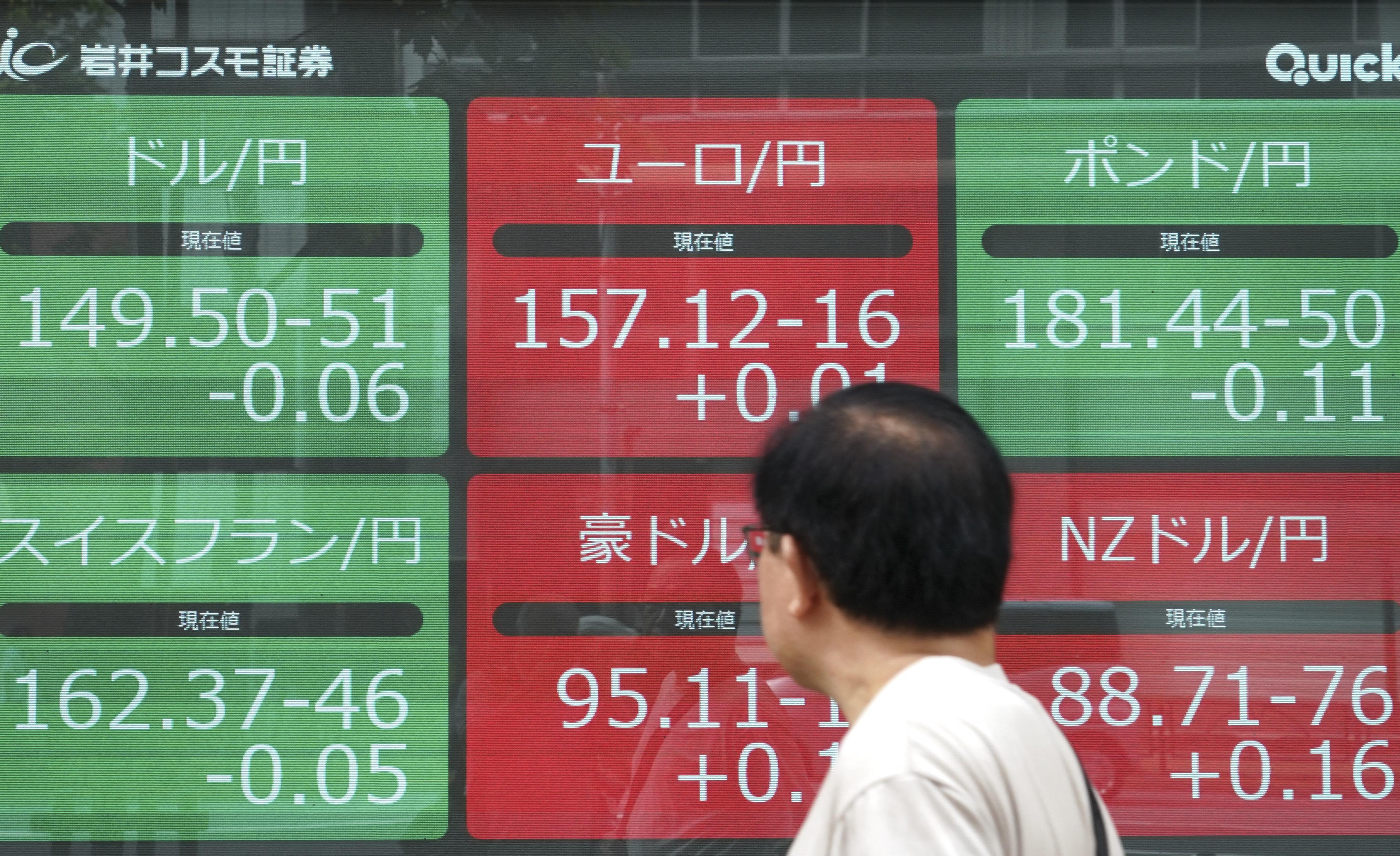 A man walks in front of an electronic board showing the rate of the Japanese yen versus the US dollar (top left) and other foreign exchange rates including Euro (top center), Pound (top right), along a street in Tokyo on Sept 28, 2023. (PHOTO / AFP)
A man walks in front of an electronic board showing the rate of the Japanese yen versus the US dollar (top left) and other foreign exchange rates including Euro (top center), Pound (top right), along a street in Tokyo on Sept 28, 2023. (PHOTO / AFP)
TOKYO - Japanese authorities refrained on Wednesday from disclosing whether they had stepped into the market to prop up the yen and stressed their resolve to act against excess volatility, keeping markets on alert for the chance of yen-buying intervention.
After sliding below the psychologically important 150 per dollar mark to its weakest level in a year, the yen strengthened sharply overnight on Tuesday, leading some market participants to believe Tokyo had intervened to support the currency.
ALSO READ: Japan silent on yen intervention, warns against sharp falls
Speaking to reporters, Finance Minister Shunichi Suzuki declined to comment on whether Tokyo had stepped in, and repeated that currency rates must move stably reflecting fundamentals.
"We're ready to take necessary action against excess volatility, without ruling out any options," Suzuki said, a view echoed by top currency diplomat Masato Kanda.
But it (yen) has still depreciated around 12% so far this year, and some analysts questioned how long Tokyo can keep yen bears at bay
In a sign of the government's growing alarm over the yen's weakness, Kanda said he met Prime Minister Fumio Kishida later on Wednesday to "discuss the economy in general."
Kanda declined to say whether he discussed the yen with the premier, but told reporters after the meeting that any intervention would target volatility rather than yen levels.
The dollar hovered around 149.17 yen in Asia on Wednesday, well off the 150-line, as the remarks from Suzuki and Kanda, who are in charge of deciding whether and when to step in, kept investors on alert over intervention risks.
But it has still depreciated around 12 percent so far this year, and some analysts questioned how long Tokyo can keep yen bears at bay.
READ MORE: BOJ keeps ultra-loose policy, dovish guidance on outlook
"It's uncertain whether Tuesday's volatility was due to intervention. But judging from the government's policy and from the tools left for Japan, the finance ministry is likely keen to step in," said Yoshimasa Maruyama, chief market economist at SMBC Nikko Securities.
"But when yen-selling pressure persists, the chance of intervention reversing the dollar/yen's trend isn't high."
Under pressure
Japanese authorities are facing renewed pressure to combat the sustained depreciation of the yen, as investors confront the prospect of higher-for-longer U.S. interest rates while the Bank of Japan remains wedded to its super-low interest rate policy.
Highlighting the conflicting goals Japan is chasing, the BOJ conducted emergency bond buying on Wednesday to keep long-term rates from rising much and hurting the fragile economy
Highlighting the conflicting goals Japan is chasing, the BOJ conducted emergency bond buying on Wednesday to keep long-term rates from rising much and hurting the fragile economy.
The BOJ's decision in July to allow long-term rates to rise more freely did little to reverse the yen's downtrend, as markets focused on Governor Kazuo Ueda's pledge to keep easy policy until durable growth in wage and inflation is foreseen.
Kanda brushed aside the view that authorities were trying to defend a certain yen level, saying that they look at various factors with a focus on market volatility.
"If currencies move too much on a single day or, say, a week, that's judged as excess volatility," Kanda said.
"Even if that's not the case, if we see one-sided moves accumulate into very big moves in a certain period of time, that's also excess volatility," Kanda added. He declined to comment on whether the overnight yen moves were excessive.
But former BOJ official Hideo Kumano warned against taking the comments at face value, pointing out that Tuesday's yen spike had the footprints of intervention.
READ MORE: Japan makes record $52.6b defense spending request
"It's a strong show of resolve by Japanese authorities that they won't tolerate the yen's decline below 150," said Kumano, who is now chief economist at Dai-ichi Life Research Institute.
"By not disclosing whether they've intervened, authorities can instill caution in the market on what they could do next."
While a weak yen gives Japanese exports a boost, it has been a headache for both policymakers and households alike, by inflating the cost of raw material imports.
With inflation already exceeding the BOJ's 2 percent target for more than a year, the yen's recent declines put pressure on the central bank when it meets for a rate review ending on Oct 31.
"If the dollar/yen moves sharply above 150, the BOJ could push forward the timing of a policy tweak," said Ryutaro Kono, chief Japan economist at BNP Paribas Securities, predicting that there was a slim chance the bank could act this month.
Tokyo last intervened to buy yen in September and October last year, when the Japanese currency eventually slumped to a 32-year low of 151.94 per dollar.


